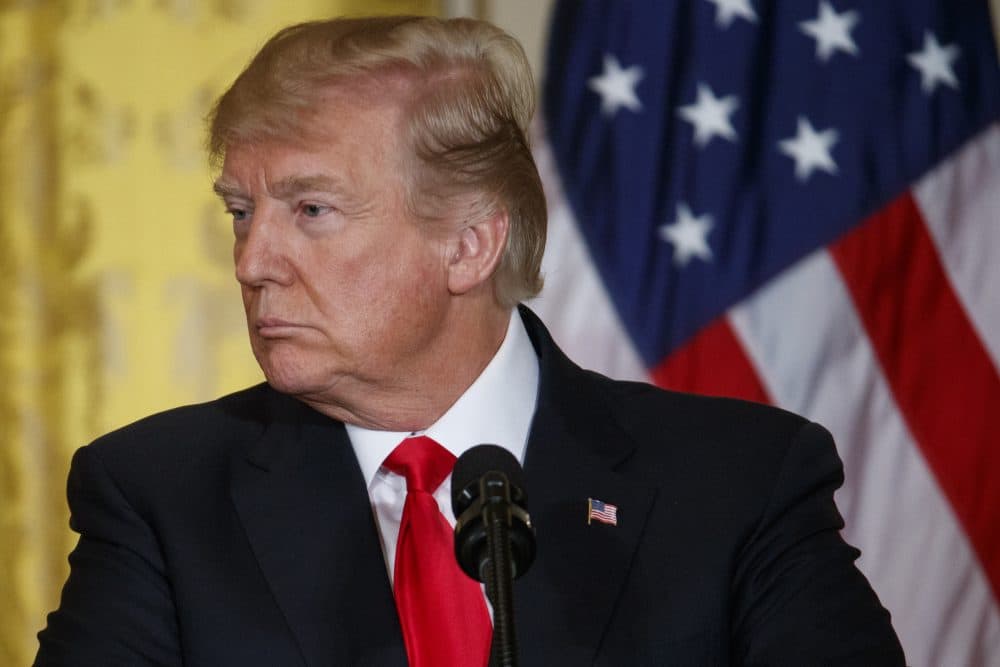Advertisement
The Reality Show In The White House
Resume
This week on Freak Out And Carry On, Ron Suskind and Heather Cox Richardson talk with Julian Zelizer, professor of history and public affairs at Princeton University. They discuss the debate around President Trump's mental fitness, the history of the 25th amendment, and whether or not Oprah should run for president in 2020.
Excerpts
Ron Suskind: What the hell is going on, Heather? Help us. Give us history, Heather! What the hell is going on? Do you, personally, have a precedent for what you're feeling in this moment?
Heather Cox Richardson: No. We're in uncharted territory, off the map.
Ron Suskind: So look we are going to talk about stable geniuses and unstable ones. I just keep thinking of the phrase "a reality show" because people say it again and again. Donald Trump is running a reality show here in the West Wing and throughout the nation and the ratings are off the charts. I mean you love him or you hate them but everyone's watching, everyone around the world. But those two words "reality" and "show" are tricky little words. Break them apart. I mean because what you have is the show. We know the show. The show seems to be of an insane man. But the big change with the arrival of Michael Wolff's uneven, but certainly unstoppable book, "Fire and Fury", on the New York Times bestseller, is that it's giving us a glimpse of the underlying reality from people around Trump who, up to now, have not spoken. It's led by Steve Bannon, but others, of course, populate the book and they're saying the same thing on the inside as people are saying on the outside. That's why we're having this discussion. They have that glimpse. We only care about these aides because they're close to the decider. Through their eyes we get to see something that we wouldn't otherwise see out in the wild. And they're concerned, again and again, you hear it's 25th Amendment talk in the white building. And that's why today we will talk about compos mentis and the duly elected orange one.
Heather Cox Richardson: One of the things that seems to be so important about this moment is that while all those things are true it's being spun from Trump supporters as being a partisan attack. And I want to really emphasize that my take on this is not a partisan take on this. I think if you look at the president that we have right now, he is behaving in ways that if you saw them in a relative--your dad, your grandpa--you would want a full neurological evaluation and you certainly would not give him the car keys. And I'm not meaning that in a derogatory way, you would be very concerned for the trouble that he could get himself or other people into. And when you think about that situation and then think, oh, by the way, he's got the nuclear codes, you got to say, this is not a time for partisanship. All the people who are quietly saying this behind the scenes should be saying it in public and should be returning us to some kind of politics that, maybe, I don't personally like, but that at least gets us out of the territory of having a person of really questionable mental acuity in charge of the potential to destroy the world.
Julian Zelizer: I think this is a fair conversation to have. I am someone who thinks that the mental fitness of a president should always be fair for discussion. We want to know how a president's mind works. But the book, "Fire and Fury", is really secondary. The reason the debate has emerged is everything we've seen since the campaign, let alone since inauguration. The president's own words, his statements on Twitter, his willingness to use name calling and all kinds of provocative language against adversaries abroad and adversaries at home has raised the question many times. And it is not, as Heather said, a partisan issue. You've heard Republicans such as Senator Bob Corker make statements about how he handles this job in terms of his mental capacity. The president willingly engages this side of his personality. We don't know if it's all put together as some kind of political show or this is him, front and center, in front of our eyes. Is this how he acts? But I think after this book it is not a wonder people are asking. And it's legitimate. From the nuclear power that the president has or the power of the president to make provocative statements that really matter here in the country about issues like race and immigration, if he will act this way it's fair for people in both parties to ask the question, is he fit to hold the office?
Heather Cox Richardson: I would like to point out to both you guys though that if you look at old tapes of Trump of President Trump, he was very coherent. He was able to put together not only sentences but also thoughts. He was able to answer questions. He could carry on conversations. He was quite a good conversationalist. And that obviously is long gone. That raises the question, should we be talking about the 25th Amendment and can you walk us through what the 25th Amendment was and why it's in place?
Julian Zelizer: The 25th Amendment was passed by Congress in 1965. It was ratified in 1967. It comes in the aftermath of John F. Kennedy's assassination and it basically is setting up the processes for succession if a president dies or resigns or what happens if we don't have a vice president, how a new vice president selected. But there's part of that amendment which also talks about the ability of the vice president and cabinet, with congressional approval, to take action if the president is "unable to discharge the powers and duties of his office." It's a pretty difficult process. Basically the vice president and a majority of the Cabinet have to decide that the president can no longer function and fulfill the responsibilities of the job. They have to send the letter to Congress saying this, and the vice president becomes the acting president immediately. But then at that point the president has the right to send a letter back to Congress saying I can do the job and I don't agree with this. And if that happens the vice president and the cabinet again have to come to Congress with another letter but that time you need two thirds approval of the House and the Senate, which is even more then you'll need to support impeachment. So it's a very high bar and you're asking people who the president himself has nominated, a vice president who he is selected to make this statement. And the one last thing, there's a debate, did the 25th amendment mean physical impairment or did it also include his mental fitness, the president's mental fitness? I think there's a lot of agreement and it did include that.
The views and opinions expressed in this podcast are solely those of the participants and do not in any way reflect the views of WBUR management or its employees.
